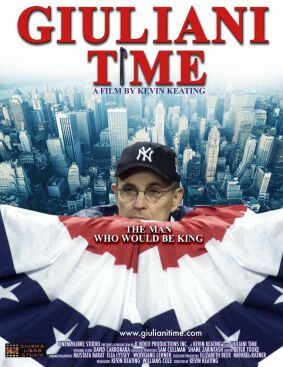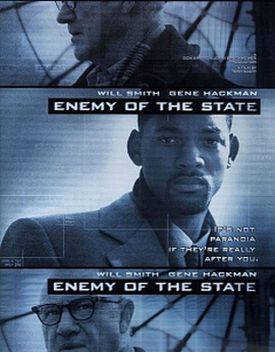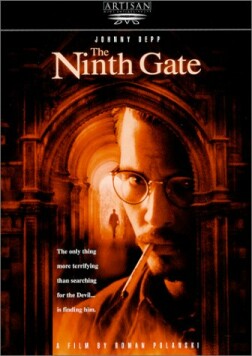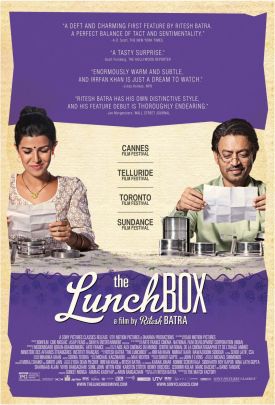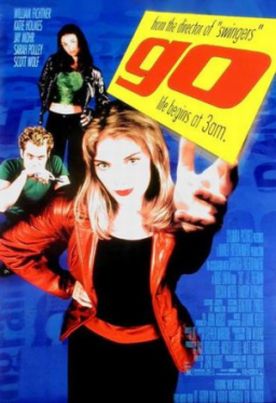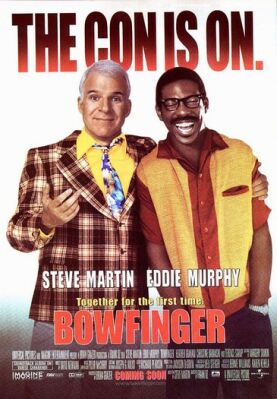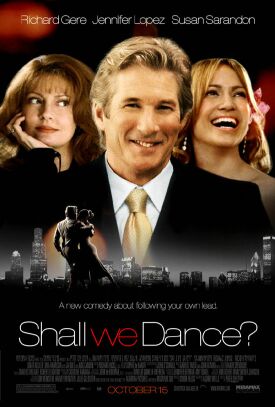Giuliani Time
The press materials for Kevin Keating’s Giuliani Time claim that the film “is certain to bust open the myth of Giuliani.” This, I’m afraid, is not true. The “myth” referred to — namely that Rudolph Giuliani was a good, even a great, mayor of New York who thus has earned his shot at national office — has long since been burst for the only people likely to see the film, namely those who already hate him. For those who actually believe in the allegedly busted myth, however, there is nothing in it that could possibly tempt them to watch this film. All it has to offer are people — Wayne Barrett of the Village Voice, Rudy Crew, David Dinkins, John Hynes, Ed Koch, William Bratton, the Rev. Al Sharpton et many al. — who have been criticizing Mr Giuliani for at least a decade, all saying exactly what they have said a thousand times before.
The few pro-Giuliani voices are drowned out or placed in a context meant to suggest that they, too, support the film-maker’s view. Thus when Myron Magnet of the City Journal and the Manhattan Institute says that, after Giuliani’s reduction in the welfare rolls, “nothing visible happened,” it is taken as evidence for the film’s thesis that the poor, former welfare recipients, were now just being kept out of sight. Generally speaking, Mr Keating’s attempt to fight a lonely rearguard action against welfare reform when even many of Mr Giuliani’s critics acknowledge that it has been a huge success adds to the bizarre and cranky quality of his film. When someone introducing him in a speech at the Reagan library describes Hizzoner as “a true heir of the Reagan legacy,” we may gather that this is meant to be no compliment in Mr Keating’s eyes, but he himself seems to take it for granted.
The film’s trip down memory lane is also illustrated with shots of what Mr Keating obviously regards as the anti-Giuliani forces’ finest hours, namely scenes from rowdy and shrill street demonstrations, especially those which took place after the Abner Louima, Brooklyn Museum and Amadou Diallo affairs. These scenes suggest how small a segment of the potential audience this film was meant to appeal to, as if the fact that demonstrators could regularly be turned out who were prepared to call the mayor “criminal” and “Nazi” and other vile names were self-evidently an indication of his political and moral shortcomings rather than of theirs.
Likewise, at one point we see the mayor saying that the police officers involved in the Diallo shooting had had excellent service records: “That’s their background,” he says. Then, without comment, we cut to a hysterical demonstrator saying “How can he say they’re excellent officers?” Are we meant to notice the misunderstanding and misrepresentation of what Mr Giuliani had said and thus either the stupidity or the dishonesty of the demonstrator? I don’t think so. The unrelenting hostility of the film to its subject suggests, rather, that we are meant to understand it the same way ourselves. But anyone who doesn’t already hate him and who wanders into this film by mistake may find himself, as I did, thinking him more attractive rather than less — if not on account of the substance of his views then on account of the unlovely, snarling quality of so many of his detractors.
By contrast, he himself is often seen laughing and is obviously a good sport, appearing in two different outlandish costumes, once as a woman once as a painted savage, in skits designed to make fun of his own image as tough guy. Mr Keating’s documentary is so lacking in humor or a sense of irony that it takes these satirical sketches as yet more damning evidence that the former mayor is the heartless wretch that everything else in the movie is designed to reveal him as. Such humorlessness clearly differentiates Mr Keating from his model, Michael Moore. Like Mr Moore’s films, Giuliani Time is meant to be seen and can be appreciated only by those who already agree with the views expressed in it. It attempts to build upon Mr Moore’s transformation of the documentary into a circus-like entertainment — except that it forgets to be entertaining. Rudy Giuliani, should he actually have ambitions for higher office, has nothing to fear from it.
Discover more from James Bowman
Subscribe to get the latest posts to your email.

